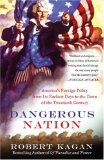Summary | Excerpt | Reviews | Beyond the Book | Readalikes | Genres & Themes | Author Bio
America's Place in the World from Its Earliest Days to the Dawn of the Twentieth Century
by Robert Kagan

Critics' Opinion:
Readers' Opinion:
First Published:
Oct 2006, 544 pages
Paperback:
Nov 2007, 544 pages
 Book Reviewed by:
Book Reviewed by:
BookBrowse Review Team
Buy This Book
Not only has the original Puritan mission often been misunderstood, therefore, but the rapid absorption and dissipation of Puritanism within the mainstream of colonial American society meant that the Puritan influence in shaping the character of that society, and its foreign policies, was not as great as has sometimes been imagined. Most of America outside of New England had never been under Puritan influence, and by the early eighteenth century even New England was no Puritan commonwealth but a rising center of liberalism and commercialism. In the seventeenth and early eighteenth centuries it was the southern and middle colonies, not New England, that “epitomized what was arguably the most important element in the emerging British-American culture: the conception of America as a place in which free people could pursue their own individual happiness in safety and with a fair prospect that they might be successful in their several quests.”
The society and culture that took root in the Chesapeake Bay region had far greater influence on the evolution of American society, and therefore on American foreign policy, than did Puritanism. This colonial America was characterized not by isolationism and utopianism, not by cities upon hills and covenants with God, but by aggressive expansionism, acquisitive materialism, and an overarching ideology of civilization that encouraged and justified both. In Virginia and the other settlements along the Chesapeake Bay that predated the Puritans’ arrival in New England, the dreams that drew Englishmen to a rough and untamed country were of wealth and opportunity, not the founding of a new Israel. The boom years that came to Virginia in the middle of the seventeenth century produced no utopia but, at first, an almost lawless capitalism run amok: the “fleeting ugliness of private enterprise operating temporarily without check,” a “greed magnified by opportunity, producing fortunes for a few and misery for many,” and, of course, the first steps “toward a system of labor that treated men as things.” Although gradually this rampant capitalist beast was tamed by the establishment of laws and institutions modeled after England’s, the acquisitive, individualistic, modern spirit of liberalism formed the bedrock of American society more than a century and a half before the American revolution proclaimed liberty and the pursuit of happiness to be the natural rights of all men.
This acquisitive individualism was the powerful engine of an Anglo-American territorial expansion that was neither particularly godly nor especially peaceful and certainly not “self-denying.” In the Chesapeake Bay area settled by the Virginia Company and its “adventurers,” expansion throughout the tidewater began immediately, stretching up the fertile and accessible valleys of the James, Rappahannock, and York rivers. In the Massachusetts Bay Colony, too, expansion from Boston into the Connecticut Valley and the New England interior began within a few years after the colony’s founding. In both the northern and southern colonies expansion brought the settlers into bloody conflict with Indians—first the Pequot and later the Wampanoag, the Narragansett, and the Nipmuck in the North, and the Susquehanna in the South. In 1637 settlers from Boston and the Connecticut River Valley united in a two-pronged attack that ended in the massacre and virtual extermination of the Pequot. That victory opened up even more territory for expansion and settlement, which in turn led less than four decades later to another, albeit more costly triumph for the expansion-minded settlers against an alliance of Indian tribes loosely led by the Wampanoag chief whom the Anglo-Americans called King Philip. In Virginia that same year Governor William Berkeley’s refusal to launch a war against the Susquehanna resulted in a frontier rebellion led by Nathaniel Bacon and the burning of the Virginia capital of Jamestown. Thereafter in Virginia, as in New England, expansion proceeded apace throughout the latter half of the seventeenth century and into the eighteenth, out into the Virginia Piedmont and the Great Valley of the Appalachians and, in the north, up into Vermont and New Hampshire.
Excerpted from Dangerous Nation by Robert Kagan Copyright © 2006 by Robert Kagan. Excerpted by permission of Knopf, a division of Random House, Inc. All rights reserved. No part of this excerpt may be reproduced or reprinted without permission in writing from the publisher.





The Flower Sisters
by Michelle Collins Anderson
From the new Fannie Flagg of the Ozarks, a richly-woven story of family, forgiveness, and reinvention.

The House on Biscayne Bay
by Chanel Cleeton
As death stalks a gothic mansion in Miami, the lives of two women intertwine as the past and present collide.

The Funeral Cryer by Wenyan Lu
Debut novelist Wenyan Lu brings us this witty yet profound story about one woman's midlife reawakening in contemporary rural China.
Your guide toexceptional books
BookBrowse seeks out and recommends the best in contemporary fiction and nonfiction—books that not only engage and entertain but also deepen our understanding of ourselves and the world around us.